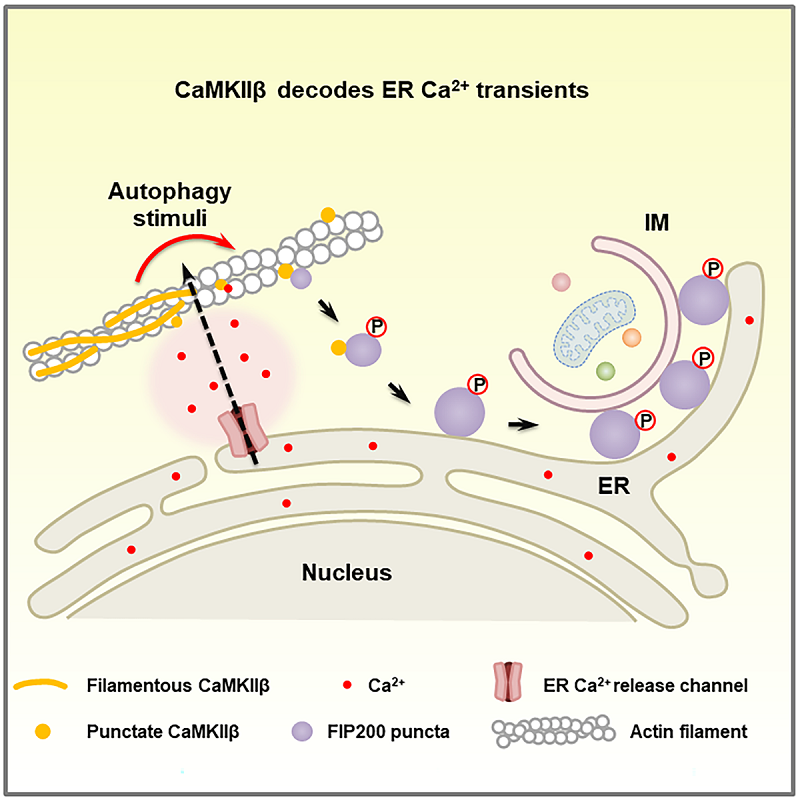Scientists found CaMKIIβ is involved in transducing Ca2+ transients to initiate autophagosome formation
Ca2+ acts as a versatile signal to control a myriad of cellular activities. Ca2+ signals are highly dynamic, exhibiting complex spatio-temporal forms such as Ca2+ transients that differ in frequency, amplitude and duration. One of the molecular machineries to decode frequency-encoded Ca2+ signals is CaMKII, which belongs to a family of multifunctional CaMKs.
Autophagy involves the engulfment of a non-selected portion of the cytosol or specific cargoes into double-membrane autophagosomes and their subsequent delivery to lysosomes for degradation. It is crucial for cells to cope with various stresses such as starvation and also to maintain homeostasis. Autophagosome initiation is specified by Ca2+ transients on the ER cytosolic surface elicited by autophagy stimuli. ER Ca2+ transients trigger liquid-liquid phase separation (LLPS) of the FIP200 complex, and the resultant puncta associate with the ER.
Recently, a research team led by Prof. ZHANG Hong from the Institute of Biophysics, Chinese Academy of Sciences published an article in 《Molecular Cell》on December 31, 2024 , titled "Ca2+/calmodulin-dependent protein kinase II β (CaMKIIβ) decodes ER Ca2+ transients to trigger autophagosome formation".
In this article, they showed that CaMKIIβ decodes the ER Ca2+ transients to specify autophagosome formation. In response to Ca2+ transients, the actin filament-bound CaMKIIβ forms condensates with which FIP200 puncta associate. CaMKIIβ phosphorylates FIP200, which modulates LLPS of the FIP200 complex and induces organization of FIP200 puncta into functional autophagosome formation sites. CaMKIIβ also controls the amplitude, duration and propagation of ER Ca2+ transients during autophagy induction.
Autophagy regulates neuronal development and function, such as memory formation, erasure and learning. CaMKIIβ plays a pivotal role in synaptic plasticity, learning and memory formation. Mutations in CaMKIIβ have been identified in patients with the neurodevelopmental disorder MRD54, which is characterized by delayed psychomotor development and intellectual disability. Zhang lab found that CaMKIIβ mutations identified in this disease also affect the function of CaMKIIβ in autophagy.
Based on the current research progress, researchers indicated that CaMKIIβ is involved in transducing Ca2+ transients to initiate autophagosome formation.

Figure. Model for the role of CaMKIIβ in transducing ER Ca2+ transients to autophagosome formation on the ER
(Image by ZHANG Hong's group)
Article link:https://www.cell.com/molecular-cell/fulltext/S1097-2765(24)01000-1
Contact: ZHANG Hong
Institute of Biophysics, Chinese Academy of Sciences
Beijing 100101, China
Email: hongzhang@ibp.ac.cn
(Reported by Prof. ZHANG Hong's group)

